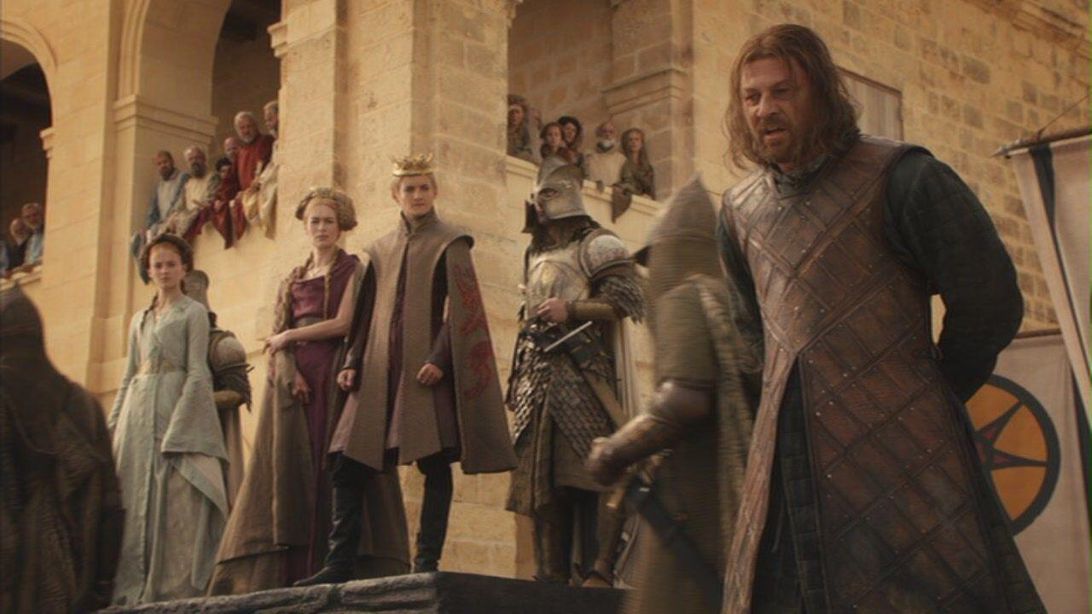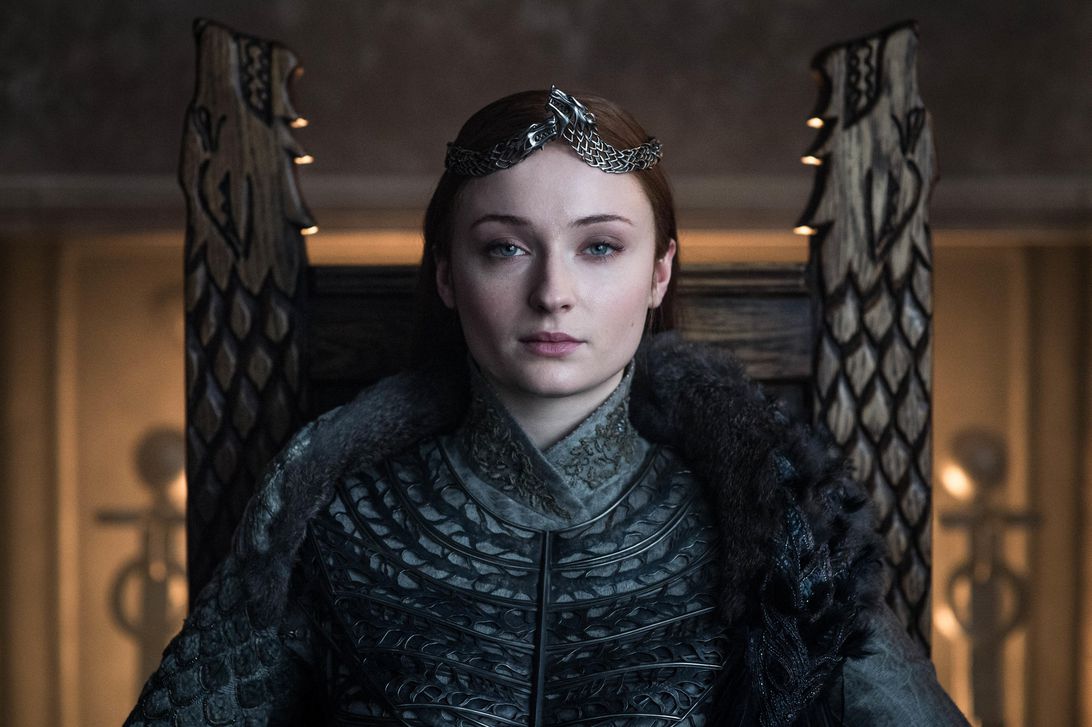
Ned Stark’s final moments in season 1.
HBO
Many TV shows run for years without etching out a truly enduring moment, but it took Game of Thrones just nine episodes to produce an all-time great. In Baelor, episode 9 of season 1, around 2.7 million watched as the admirable Ned Stark, seemingly the franchise’s protagonist, was beheaded ignominiously by Boy-King Joffrey.
It’s often said that Stark’s death trained the audience to not expect their heroes to live. But it established the show in a more important way. It was the first of many Game of Thrones moments that transcended Game of Thrones. The Red Wedding in season 3, Jon Snow’s death in season 5, Hold The Door in season 6.
These weren’t just memorable Thrones moments, they were memorable TV moments. I know because, coming late to the franchise in 2016, I had heard about all of them without ever having laid eyes on a single second of the show itself.
Yet these enduring moments are only part of Game of Thrones’ legacy. Tuesday marks one year since the show’s finale aired, since Jon Snow broke the wheel and since Bran became king. There’s no way around it. The finale and the final season as a whole were notorious letdowns.

Sansa Stark finally earned her crown.
HBO
I vividly remember watching The Iron Throne, as the finale episode was named. It was in CNET’s Sydney offices, with the entire team. I remember the groans of my editor as it became clear that Daenerys’ newfound villainy would receive no thoughtful explanation. I remember my colleague laughing, with unmistakable ridicule, at Bran becoming the new king. And I remember thinking this: “They’re too harsh. There’s a lot to like here.”
But from the second the credits rolled, the question, even for someone like me who didn’t hate the home stretch, was clear. How badly would this tarnish Game of Thrones?
The short answer: a lot, but not completely.
Contrary to what you may read on Change.org, Game of Thrones isn’t ruined. Nearly 2 million people signed a petition on that site to have the final season reshot with “competent writing.” But even among those who disliked the season, calls for it to be remade felt like an empty protest.
If the petition achieved anything, it was catching the eye of many Game of Thrones stars. They weren’t stoked to discover it.
“It feels a bit ungrateful,” tut-tutted Carice van Houten, aka Lady Melisandre, in an interview with Insider. “You’ve had such great times and then yeah, you’re going to be disappointed because it’s not going to go exactly how you anticipated.”
Sophie Turner, who played our Queen Sansa Stark, was more indignant.
“The thing about Game of Thrones that’s always been amazing is the fact that there’s always been crazy twists and turns,” she said. “So Daenerys becoming something of the Mad Queen — it shouldn’t be such a negative thing for fans. So many people worked so, so hard on it, and for people to just rubbish it because it’s not what they want to see is just disrespectful.”
These arguments, or some variation of them, is what you’ll hear from the show’s supporters. But the truth is somewhere in the middle.
First, to the Change.org crowd: The show was too good for too long for its final two seasons, which admittedly diverged from the previous six in several bad ways, to completely tank the franchise.
Like it or not, Game of Thrones is an exceptionally influential show. Shows like Breaking Bad, Mad Men and Sopranos are synonymous with “prestige TV,” but Game of Thrones has come to embody the term. With well over 13 million tuning in for its finale, Game of Thrones is the most successful example of cinematic storytelling in a TV show.
Its wins weren’t simply a matter of big budget brawls, though. Hardhome, The Wall and The Battle of the Bastards were all spectacular, but Game of Thrones’ storytelling and character development were the show’s greatest strengths.
Take Jaimie Lannister. In episode 1 of season 1, he pushed an innocent child off the top of a tower, almost killing him. By the end of season 4, thanks to thoughtful writing and a well-paced arc, he was essentially a hero.
This makes it all the more difficult to ignore that the final two seasons were so bereft of a caring touch.




Daenerys Targaryen and Jon Snow in the their final scene.
HBO
Both Turner and van Houten chalked up the Change.org petition to fans being upset because what happened — be it Bran’s ascent to royalty or Daenerys descent into madness — wasn’t what they expected to happen.
The problem isn’t so much what happened, but the carelessness with which it occurred. Daenerys took all of three episodes to go from the world’s savior to its destroyer. Jaime left Brienne for Cersei for reasons we can infer, but which were not actually clear. Cersei, the franchise’s longest-running villain, dies unceremoniously.




Some of these key moments were satisfying, but were satisfying in spite of the clumsy writing and erratic pacing characteristic of seasons 7 and 8.
It didn’t help when showrunner David Benioff memed himself, in talking about the particularly lambasted Last of the Starks episode. Saying Daenerys “kind of forgot” about the Iron Fleet (leading to one of her dragons being shot out of the sky). Or that the finale’s script noted that when Drogon burned the Iron Throne, he didn’t do so because his dragon brains knew that its allure had corrupted Daenerys. Rather the throne, the show’s eponymous symbol of power, was merely a “dumb bystander caught up in the conflagration.”
Sometimes fans care too much. But instances like these made it feel like fans cared more than the creators.
The final season wasn’t without highlights. Brienne getting knighted was a strong Thrones moment, and I’d put the final 10 minutes of The Battle of Winterfell up against any other 10 minutes of the show. Still, a year later, I’ve concluded that the first six seasons’ strengths cannot completely make up for the final weaknesses.
Game of Thrones will endure as one of the great achievements in television history. But part of its legacy is a lesson: Endings are hard. No matter how great a show is, don’t count on its conclusion to satisfy until you see it with your own eyes.
Perhaps the most stirring part of Ned Stark’s death was that, to the citizens of King’s Landing, he died a traitor. A lifetime of honor, loyalty and sacrifice couldn’t save him from a disgraceful end. It hurts to say that Game of Thrones suffered a similar fate.



















![[Book Review] The Blade Itself (The First Law Trilogy) by Joe Abercrombie](https://bendthekneegot.com/wp-content/uploads/2018/01/1516047103_maxresdefault-218x150.jpg)


















